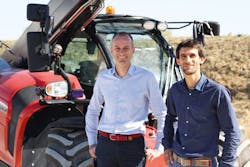Q: What does the electronically controlled hydrostatic transmission bring to this type of machine?
A: Hydrostatic transmission offers more flexibility in terms of design. Taking out the mechanical gearbox makes it possible to create more compact machines. It’s also more precise, flexible, and comfortable to use, especially as there are no gears to change.
What’s more, the electronic control provides standard functions that are increasingly appreciated by users, such as inching, speed limiter, eco-mode, and manual accelerator. It also offers the possibility of combining flexibility and precision with dynamic behavior, something that is more difficult with other technologies.
Compared to conventional hydrostatic solutions, electronic control helps to reduce fuel consumption, better protect components, and facilitate diagnosis in case of failure. All these benefits are in line with the Reduce program we just mentioned.
Q: What are the advantages of the BODAS- drive DRC application software?
A: The DRC platform contains many features that we can control and use to make our own settings, which gives us plenty of options for customization. This is essential for us, because it means we can create the profiling that will allow our users to recognize, in the behavior of the machine, Manitou’s specific characteristics. For some functions, users can also create their own settings.
DRC contains all the Bosch Rexroth expertise in hydraulic control, which means we don’t have to start from scratch. The expertise of the platform combined with the skills of the teams make it feasible to deploy a transmission very quickly: It’s possible to reach 80% of the expected results in just one week. The remaining 20% requires more time, because it is a matter of further optimizing the results on the basis of the evaluations of our testers and users. But again, DRC provides an advantage: As we have control over the settings, the change loops are much quicker.
Finally, after the appropriation phase of the first project, the DRC software platform really saves time in development. This is a real point in its favor for subsequent projects.
Q: How did the cooperation with the Bosch Rexroth teams go?
A: We’re long-standing partners, and we’ve always had a good relationship. Bosch Rexroth really makes an effort to understand our needs. On this project, we
particularly appreciated the availability and reactivity of the teams, but also Bosch Rexroth’s ability to customize its software to meet our needs. The result is not an off-the-shelf product, it evolves according to our own constraints, and we feel our demands are heard.
Q: What other projects are you working on with Bosch Rexroth?
A: We’re in the process of demonstrating new solutions on a new machine. We’re also interested in the possibilities offered by the BODAS-drive eDA software.
It seems it might be faster to apply than DRC, and might allow us to further reduce our development time—so it could be well-suited to some of our product ranges. We aim to test it this year on a machine well-known to our users to evaluate the new features provided.
This information was submitted by Didier Krupezack, sales engineer, Mobile Applications, Bosch Rexroth France.


